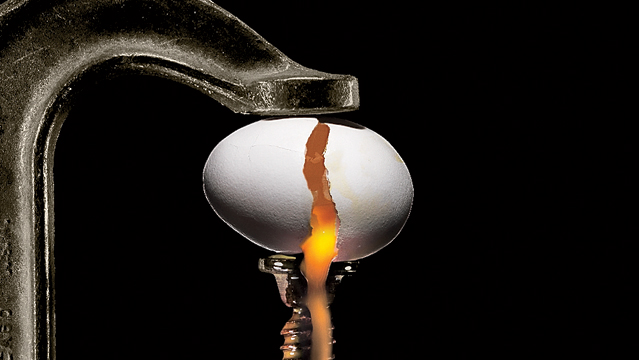Training hard but still eating like you’re not? You could wind up with hormone deficiencies. The consequences can be dire: low energy, diminished sperm count, and an inability to conceive children.
John Miller felt terrible. The 44-year-old amateur track cyclist from Washington State had lost his extra gear—that boost of energy that propelled him to a pair of podium finishes in state-championship velodrome races since he’d picked up the sport in his thirties. Now he was finishing at the back of the pack and, during workouts, couldn’t hit his peak heart rates. He’d put on weight and developed dry skin. During the day he suffered from extreme fatigue, and at night he couldn’t sleep. Like many competitive athletes, Miller responded the only way he knew how: he trained harder. When that didn’t help, he finally dialed back his effort but felt awful anyway.
“I’d finish a rest week and still feel lethargic,” he says. “It was like I was going through menopause.”
In a sense he was. When Miller (who shared his story on the condition that his real name not be used) finally saw a doctor, tests showed that he had severe hormone deficiencies. The cause? Poor nutrition. Quite simply, he hadn’t been eating enough. His body, in starvation-survival mode, had drastically slowed his metabolism and cut hormone production.
Miller’s circumstances sound extreme, but they’re not unusual. With endurance sports booming—participation in triathlons alone jumped 56 percent in the past five years, to 2 million racers—a growing number of recreational athletes are developing serious hormone deficits from inadequate fueling. Unlike elite competitors, who follow carefully calibrated diets, amateurs tend to prioritize nutrition below improving race times and developing a lean physique. With busy schedules, they religiously chart their workouts but treat their fueling strategies as an afterthought. And surprisingly, it doesn’t take an Ironman-caliber fitness regimen to seriously erode hormone levels. Even newbie half-marathoners can have issues if they don’t eat enough at the right times.
“It’s scary what we’re seeing with amateur competitors,” says Dr. Emily Cooper, of Seattle Performance Medicine, who has treated Miller and more than 200 other athletes suffering from hormone deficiencies in the past 20 years.
According to Cooper, many athletes with low hormone levels aren’t aware that they have a problem, because their symptoms are easily chalked up to the normal wear and tear of training. This is especially true for men, who don’t have the monthly cycle that women have to help monitor their bodies. Some discover their condition only after seeking out fertility testing when they’re unable to conceive a child.
Dr. David Olive, president of the Wisconsin Fertility Institute, has also seen a spike in this phenomenon. Since 1985, he’s helped hundreds of athletes who had difficulties conceiving children due to low hormone levels. The majority of them, he says, are average weekend warriors who started pushing their fitness without increasing their food intake. “I see this more often with recreational athletes than those who are really hardcore,” Olive says.
The science linking nutrition to hormone levels is well established. When your brain senses that you’re burning more calories than you’re consuming, it curbs production of leptin, a hormone that regulates appetite and metabolism. You feel hungry, and your digestion slows so you can conserve energy. Once your leptin levels fall below a certain point, your brain senses that you’re starving and orders the body to halt nonessential work like the creation of testosterone, estrogen, and other reproductive hormones. The fallout can include loss of muscle and bone density, diminished sex drive, and low energy. Research has shown that exercise-induced hormone deficits in men can result in fewer and less-healthy sperm; in women they can cause irregular menstrual cycles.
Fortunately, both Cooper and Olive say most athletes can recover by rebooting their diets and temporarily dialing back or halting their workouts. Not that digging out of a hormonal hole is easy—it can take months to nourish your body back to the point where it’s confident you have fuel to spare. This means eating many times a day, increasing calorie consumption, and never working out on an empty stomach. Meals should have a balance of carbohydrates, protein, and fats. “My number one advice is to make sure calories in equals calories out,” Olive says.
Miller learned this the hard way. By the time he went to Cooper, his testosterone levels were so low that she prescribed him hormone replacements, along with nutritional supplements, and advised him to cut out all high-intensity workouts. “I jokingly said I had the testosterone of a little girl,” Miller recalls. “She said, ‘Yeah. You do.’ ” After five months he returned to serious training. He plans to start racing again this summer when his hormone therapy is complete.
“Athletes flirt with their limits all the time,” he says now. “My body was screaming for help. I had to learn to listen.”
